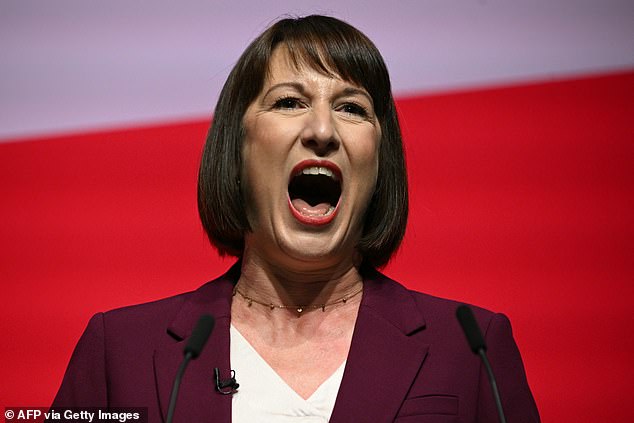When it comes to travel plans for Chancellors engulfed in market turmoil, it is a case of being caught between the devil and the deep blue sea.
If you stay in Britain, it is an acknowledgement that markets have you in their sights and have scented weakness. If you go ahead with fulfilling commitments, the risk is that you are in the wrong place and political and financial opponents can pounce.
It will be hard for Rachel Reeves to banish such thoughts as she heads to China this week.
Putting aside the political, strategic and human rights aspects of a trip, which is unlikely to be much favoured at Mar-a-Lago, Reeves might want to think about the fate of her predecessors.
In 1976, before the current Chancellor of the Exchequer was born, a heavyweight Labour predecessor Denis Healey turned back at Heathrow, on his way to an International Monetary Fund gathering in Manila, as sterling sank on markets.
More recently, in Reeves’ direct sight, Kwasi Kwarteng was summoned back from Washington to London to be defenestrated after the unaudited Truss-Kwarteng mini-Budget was upended by bond markets.

Failing: Chancellor Rachel Reeves’s £40bn tax raising budget has provoked a crisis in the public finances
The revolt against Rachel Reeves’ Budget in October has been a slow burn. A mood of political crisis has been avoided but it is very much in the ether.
The interest rate yield on Government bonds – gilt-edged stock – has ballooned. At 4.8 per cent the return on ten-year gilts is now higher than at the time of Truss’s disastrous tax-cutting Budget in the autumn of 2022.
The yield on 30-year bonds at 5.35 per cent is at its highest level since August 1998.
Truss’s mini-Budget ignited a crisis for Britain’s pensions industry which foolishly had turned the UK’s supposedly safest investment into a complex derivative – liability-driven investments (LDIs).
Reeves’ £40billion tax-raising budget and her greater empowerment of the Office for Budget Responsibility (OBR) has provoked a crisis in the public finances.
If bond yields remain this elevated for any length of time, Reeves will be close to breaching her own fiscal rules within nine months of arriving at the Treasury.
The OBR forecasts could require her to raise taxes again or cut spending more deeply.
Reeves’ stewardship of the economy is rapidly being undone. Despite a large parliamentary majority, which was meant to buy stability, talking the economy down, high taxes, shifting the fiscal rules and a loss of growth momentum have placed the UK in the crosshairs of bond vigilantes.
Questions about US tariffs and higher than expected US interest rates have added to market dissonance.
Capital Economics calculates higher-than-forecast gilt yields will all but wipe out the space for extra spending against a mandate to balance day-to-day budgets by 2029-30.
The picture is worsened because much of the projected growth for 2025 looks to have dissipated after the economy flatlined in the second half of last year.
Reeves publicly committed to just one Budget a year. But if she is to keep the OBR on-side, she may well have to consider more tax increases or harsher spending deals with Government departments.
Higher gilt yields will also hurt ordinary working people and commerce because of the higher cost of fixed rate mortgages, consumer, and commercial loans.
The Chancellor has been helped until now by goodwill in the City and beyond. The market revolt has not developed into a full-blown crisis dominating the headlines and debate.
Much of the narrative has been shielded from view. The Tories were so battered by their election losses and embarrassed by the economic instability on their watch that they have found it hard to press home the way in which positive aspects of their economic legacy have been vanquished.
Vibrant growth in the first half, falling inflation and interest rates have been negated by a Budget which has slain business confidence, stifled retail sales over the holiday period and made the likelihood of big cuts in bank rate this year less likely.
Added to this is the uncertainty of future relations with the UK’s biggest single trading partner, the US.
Escaping the clutches of Trump tariffs and pressure for a boost to defence spending does not make a dismal fiscal prospect any brighter.
DIY INVESTING PLATFORMS

AJ Bell

AJ Bell
Easy investing and ready-made portfolios

Hargreaves Lansdown

Hargreaves Lansdown
Free fund dealing and investment ideas

interactive investor

interactive investor
Flat-fee investing from £4.99 per month

Saxo

Saxo
Get £200 back in trading fees
Trading 212
Trading 212
Free dealing and no account fee
Affiliate links: If you take out a product This is Money may earn a commission. These deals are chosen by our editorial team, as we think they are worth highlighting. This does not affect our editorial independence.
This article was originally published by a www.dailymail.co.uk . Read the Original article here. .


